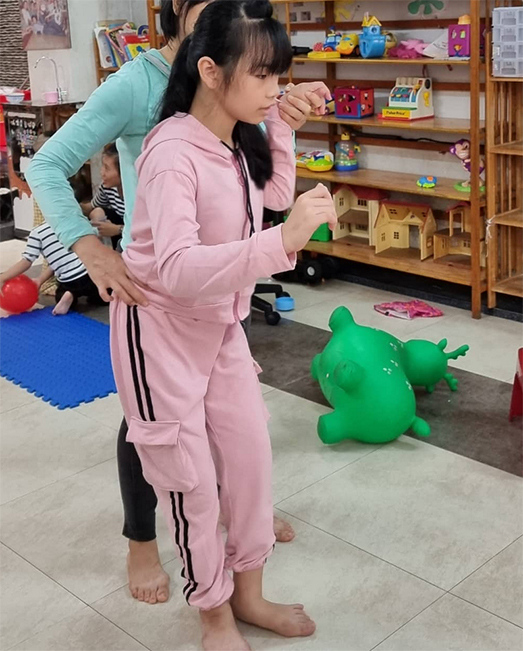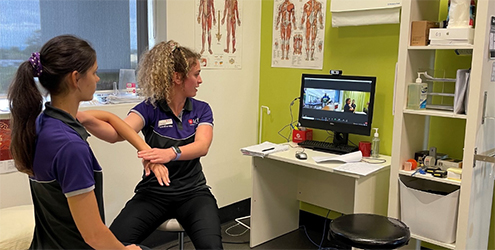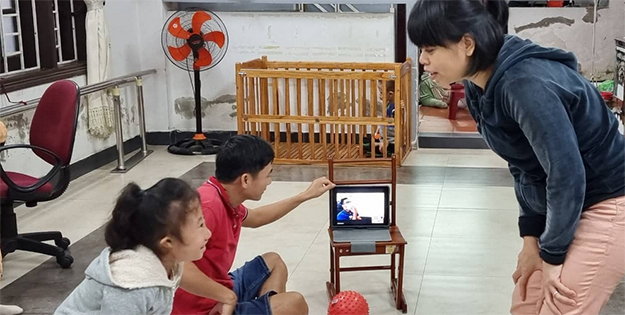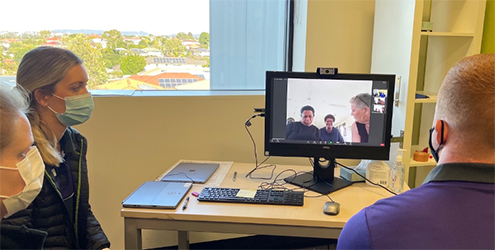Study
Copyright@ Australian Catholic University 1998-2026 | ABN 15 050 192 660 CRICOS registered provider: 00004G | PRV12008
Copyright@ Australian Catholic University 1998-2026 | ABN 15 050 192 660 CRICOS registered provider: 00004G | PRV12008

In a small building in central Hoi An, a city in Vietnam’s Quang Nam province, a physical therapist and a child with a disability stand ready in front of a computer screen. Some 7,000 kilometres south, in a pop-up clinic at ACU’s Ballarat Campus, a fourth-year physiotherapy student is on the other side of the screen, running their first-ever telehealth session.
If it weren’t for the pandemic, this physio undergrad might have been there in person on a short-term international study experience, as ACU students have in previous years in Vietnam and many other countries.
But as it turns out, these innovative student placements – run by ACU with the backing of the Federal Government through the New Colombo Plan (NCP) – led to many of the same cultural and educational outcomes as the study tours of years past.
“There were some massively positive outcomes for both our overseas partners and our students – an exchange of information that benefitted all involved,” says Alison Griffiths, a Lecturer in Physiotherapy at ACU’s Faculty of Health Sciences.
“Not one of the students from the Ballarat Campus who took part had been to Vietnam, and two of them had never been overseas. So even though we were still here in Australia, the students got a taste of a different culture, learning about different ways of communicating and some key phrases in Vietnamese, but also the different lifestyles these people lead and the different challenges that can present.”
The Ballarat telehealth clinic ran in partnership with the Vietnam-based not-for-profit Children’s Hope in Action (CHIA) and was one of four virtual international study programs for ACU physiotherapy undergraduates in 2021. The other three programs, with partners in Vanuatu and the Solomon Islands, were run from the Allied Health Clinics on ACU’s Brisbane Campus.
Initiated by ACU physiotherapy academics Mark Brown and Maria Constantinou, the virtual study experiences connected 18 ACU physio students and several staff members with overseas communities.

Virtual physiotherapy.
All four programs included telehealth consultations, education, training and support for ACU’s partners, while also providing a valuable experience to graduating students.
“The students saw many patients and made a huge difference to the lives of the people they treated — from elite athletes to people living in a remote village,” says Dr Constantinou, who has a long relationship with ACU’s partners in the South Pacific, including the Vila Central Hospital and Erakor Village in Vanuatu, and the Solomon Islands National Institute of Sports in Honiara.
“At the same time, the students found it beneficial in developing their clinical reasoning process and communication skills, and improving their cultural awareness and connection.”
While telemedicine has been touted as the next big thing in healthcare for many years, until recently it played a relatively minor role in the industry.
The pandemic accelerated the uptake of telehealth technology by both practitioners and patients, making it more mainstream to consult with physiotherapists and other health professionals via online videoconferencing.
This healthcare shift prompted leaders in ACU’s School of Allied Health to act swiftly to incorporate a digital component in student placements. In early 2021, they secured New Colombo Plan grants for the delivery of the three virtual clinical placement pilot programs.
“We ran our first NCP-funded programs in Vanuatu, with two concurrent groups of students undertaking an experience at the same time,” says Maria Constantinou, who worked closely with ACU partners and several experienced professional practice educators to implement the programs.
“On the first day, when we did our cultural orientations for the students, along with Erakor Village, the Paramount Chief was very excited because it was his first Zoom meeting ever. It was quite novel for our partners, while our students came away feeling they’d achieved some amazing things in a context they never would have imagined when they first started their degrees.”

Despite the benefits of virtual treatment, which include increased accessibility and equity of care, it does have its challenges. Physiotherapy is traditionally a hands-on profession, with a tactile and sensory component that is involved in both diagnosis and treatment.
“We feel a lot with our hands – how is the patient’s movement restricted? What might be a limiting factor? What does the joint or the muscle feel like?” says Dr Constantinou, who has taught physiotherapy in more than 25 countries and treated sportspeople at all levels
“So treating someone from a distance can sometimes be a challenge, but it’s a challenge that can often be overcome with better communication and a clear explanation to the patient of the part of their body you’re treating, and what you need them to do.”
This can have the added benefit of empowering the patient with the knowledge that enables them to play a role in their own recovery.
“We found that a lot of the patients the students treated, especially those in the village, they really valued understanding more about their condition. It made them feel respected and empowered, and in some cases, that made a huge difference to their recovery.”
This also went for the children who took part in the program from Vietnam, many of whom live with physical or cognitive disability.
“We did a lot of goal-setting to ensure we knew what the patients and their families wanted to get out of the placements, and the second priority was around making it sustainable and long-term,” says Alison Griffiths, who as well as lecturing at ACU practices as a paediatric physiotherapist.
“That meant that alongside the therapy sessions, there was a lot of education and up-skilling with the staff at CHIA about strategies, long-term goal setting and therapy ideas that they could continue to use going forward.”
For the 18 Bachelor of Physiotherapy students involved in ACU’s virtual placement programs, perhaps one of the main benefits is that they’ll take the new telehealth skills they learned into their workplace.
“Telehealth is going to be an important component of future health practice, and in our programs we are trying to better prepare our graduates for the future, rather than old or existing models of care,” says Mark Brown, ACU’s Allied Health Clinics Coordinator and the Clinic Discipline Lead for Physiotherapy.

Connecting overseas.
“Through this process, we have learned a lot, such as equipment and procedural requirements, legal issues including how to protect client confidentiality in the online space, and even how the physical set-up of our clinics can be varied to optimise the online consultation experience and effectiveness.”
Overall, those students who took part were left surprised at how demanding the process was.
“I was really challenged in the best way possible,” one student said. “Thinking on your feet, demonstrating something on camera in a different country on a screen and using the knowledge you have to translate that across to them.”
Another remarked that the experience exceeded expectations. “It enabled me to experience a different culture while practicing my physio skills in a safe environment … It was a wonderful experience.”
In future, with overseas travel being a more viable option, it is expected that virtual student placements will complement the traditional short-term international study experiences of years past.
This will enable more ACU graduates to enter the workforce ready to practice in a range of contexts.
“There’s an increasing understanding in our field of the importance of cultural capability, and being able to practice within a global context,” Alison Griffiths says.
“The students involved in these virtual placements didn’t leave Australia, yet they learned lessons about understanding and being sensitive to people from diverse backgrounds and abilities. These placements made having that opportunity and building on that skill set much more accessible, and that’s a really important thing.”
Keen to study physiotherapy at ACU? Explore the options.
Copyright@ Australian Catholic University 1998-2026 | ABN 15 050 192 660 CRICOS registered provider: 00004G | PRV12008